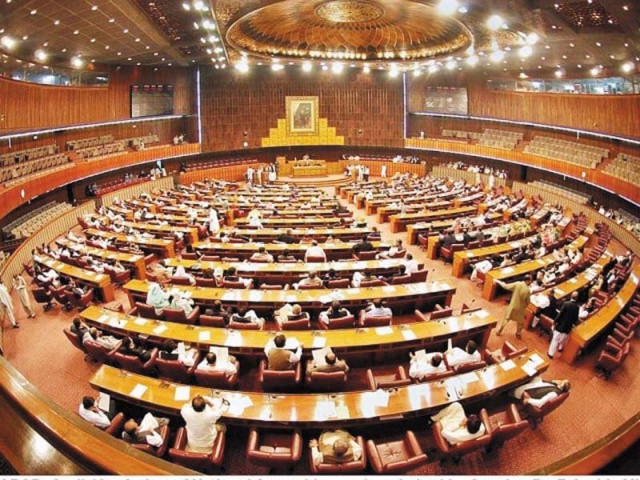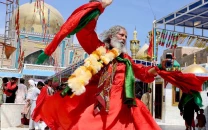Finally, laws against forced conversion?
Political, religious parties agree to effective, uniform legislation, says committee

After much back and forth over forced conversions in Sindh, political and religious parties appear to finally be on the same page about creating “effective” and uniform legislation to protect religious minorities from this matter.
In this respect, a parliamentary committee, which has been consulting stakeholders across Pakistan, concluded its four-day deliberation in Sindh on Friday.
The parliamentary committee to protect minorities from forced conversion, headed by Senator Anwarul Haq Kakar and comprising senators, MNAs and MPAs, was constituted on the directives of Prime Minister Imran Khan during his visit to Sindh last year. He had taken this step after members of the Hindu community complained against such conversions.
“We have been tasked with probing the forced conversion issue, consulting different stakeholders - including political and religious parties - and finalising recommendations for effective legislation on the matter,” explained Kakar, who belongs to the Balochistan Awami Party, while speaking to The Express Tribune.
According to the senator, they began the deliberations before Covid-19 broke out in the country.
“We met the top tiers of the Council of Islamic Ideology (CII) to get their input. The council has sought time to consult other religious parties and groups before submitting its recommendations, but they have agreed to create legislation on the matter in principle,” he claimed, adding that Islam did not permit compelling anyone to change their religion.
The next steps, according to Kakar, will involve the committee members visiting Tharparkar, Sanghar, Badin, Mirpurkhas and other parts of Sindh that have reported incidents of forced conversion next month. Then, they will visit parts of Punjab before submitting their recommendations for uniform legislation to parliament.
“It will take us three to four months to finalise our recommendations,” he went on to say, adding that the provinces, too, would make laws in the light of these deliberations.
The committee members visiting Karachi included Pakistan Peoples Party’s Senator Dr Sikandar Mandhro and MNA Ramesh Lal, Pakistan Muslim League-Nawaz’s Kheal Das Kohistani and Darshan Lal, and Pakistan Tehreek-e-Insaf’s Jai Parkash and Lal Malhi.
They met Sindh chief minister’s advisor on law Barrister Murtaza Wahab, the Sindh chief secretary, the provincial police chief and Grand Democratic Alliance MPA Nand Kumar Goklani, among others.
During the meeting, Sindh IGP Mushtaq Ahmed Mahar claimed that though the police took action and registered FIRs for the abduction of Hindu girls, the lack of legislation on the sensitive issue meant that the accused got relief from the courts.
Past hurdles
Cases of forced conversion have long been reported in Sindh, often involving the alleged abduction of Hindu girls - usually minors - who were then wedded off to Muslim men after ‘accepting’ Islam.
The Sindh government has twice attempted to outlaw forced conversion. In 2016, the Sindh Assembly unanimously passed the Protection of Minorities Bill on the matter, but the CII, Jamaat-e-Islami and other religious parties objected to an age limit for conversions and threatened to lay siege to the assembly.
“Soon after the assembly passed the bill, the then-governor did not approve it and sent it back with objections, due to the protests by religious parties,” explained Goklani. “I revised the law, addressed their reservations and submitted the bill again, but in vain.”
The revised version was introduced in 2019, but religious parties once again raised a hue and cry.
Goklani added that the parliamentary committee had praised the legislation and affirmed that it would be moved again, after consulting stakeholders.
Dr Mandhro, meanwhile, said the bill had been withdrawn because it was passed in haste, without taking religious parties into the loop. “We don’t want to create controversy, we want to take all stakeholders into confidence in order to make unanimous legislation,” he claimed.
Referring to meetings with leaders of the Hindu community, police officials and district administrations of Sukkur division, MNA Malhi said that the majority of Hindus saw the practice as part of a conspiracy to force them to leave Sindh.
“But we too are sons of this soil,” he remarked, adding that they would not allow this to happen. “We need to implement Quaid-e-Azam Muhammad Ali Jinnah’s vision to transform into a pluralist society.”



















COMMENTS
Comments are moderated and generally will be posted if they are on-topic and not abusive.
For more information, please see our Comments FAQ